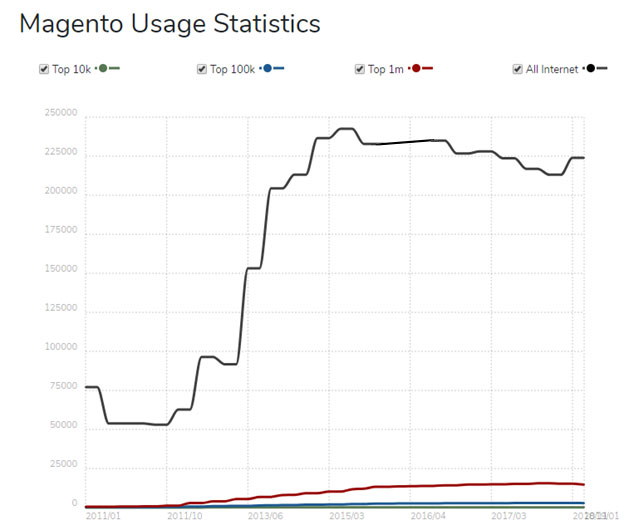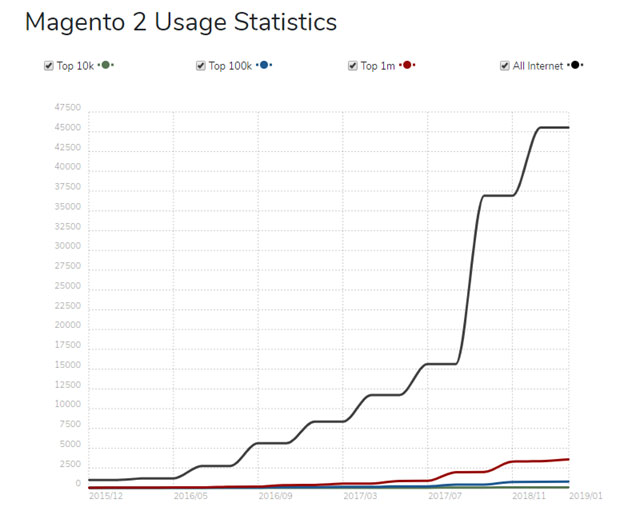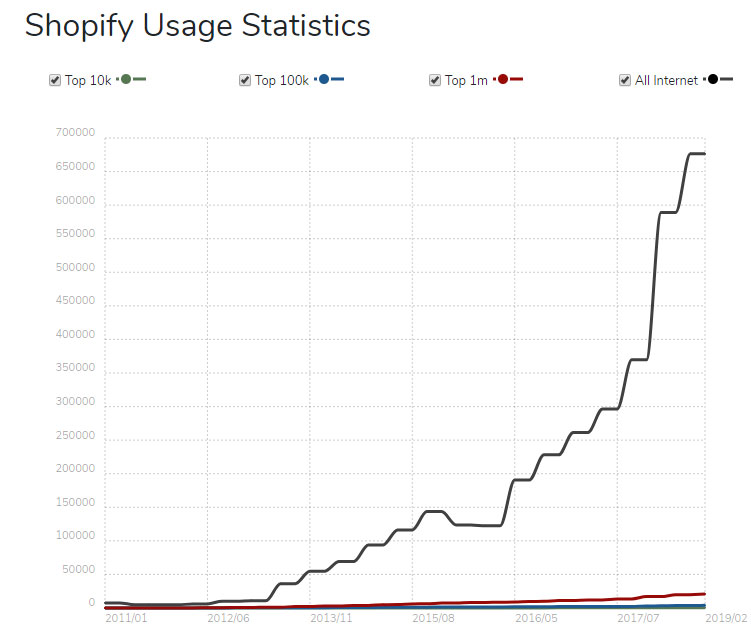
In the previous article, I described the Magento market dynamics. According to my research, there were 3 periods in the Magento platform popularity. Before the release of Magento 2 in November 2015, we can observe significant growth in the Magento stores numbers. But since the beginning of 2016 the Magento stores popularity has been declining. Moreover, in 2018 the number of Magento-based web stores in the Builtwith Tops started to decline. It means that some of the most valuable Magento-based web stores were re-platformed.
Now let’s connect all described events on the Magento market with the market of Magento extensions. It’s obvious that both markets are highly correlated. Especially, the Magento extensions market depends on the new Magento sores quantity. The more Magento stores appear the more extensions are needed to obtain required functionality.

The Magento extensions market has the same key point in November 2015.
Before this date, we can see the explosive growth of the Magento stores popularity on the graph. At the beginning of this period, there were several dozens of Magento extensions developers, most of whom had started working at the end of 2000.
In the period from 2012 to 2015, many new merchants appeared who just created a store and needed many extensions to enhance its functionality. As a result, growth of Magento stores quantity led to increasing of Magento extensions sales.
The second period on Magento extensions Market began in November 2015 when Magento 2 was released.
Since that date, the Magento stores popularity has been declining. On the other hand, Magento 2 platform popularity started to grow.
Here is the graph of the Magento 2 platform dynamics.

Let’s take a look at M1 and M2 stores numbers in Apr, 2015 год, Apr, 2017, and Apr 2019.
Why April? Because the article is being written in April 2019. I omitted 2016 and 2018 years because data was significantly distorted.

We can see that before 2017 the total Magento stores number was declining faster (-27068) than the number of Magento 2 stores was raising (11723). Moreover, after the release of Magento 2 creating a store on Magento 1 platform became unreasonable. Most of existed Magento 1 stores were already enriched by functionality. Besides, most of the merchants started thinking about migration to Magento 2. So, only a few of them decided to invest in their existed Magento 1 stores.
We can see that in the middle of 2017 the number of Magento 2 stores was growing very slowly. Magento 2 extensions sales weren’t able to compensate declining in Magento 1 extensions sales. It can explain a noticeable declining in all Magento extensions sales on which many developers complained in that period.
When Mark Lavelle announced the termination of Magento 1 support in 2018, migration to Magento 2 became much faster. On the graph, we can see a significant increase in Magento 2 stores popularity from 16K to 37K in the middle of 2017.
The M2 store dynamics became much slower when Magento postponed the termination of M1 support until June 2020. But this time is getting closer. In the nearest future, we will see high migration movements to the Magento 2 platform. Maybe the migration process will be more intensive than it was in 2017.
Let’s take a look at the Magento extensions market at that time
Magento extensions Market since 2015
The explosive growth of Magento stores popularity didn’t go unnoticed. By 2016 there were more than 100 Magento extensions developers. I counted about 100 competitors in 2016. So, maybe there were more ones. At that time nobody could suspect that Magento 2 release would stop growing Magento stores quantity. Many developers don’t think so even at the present time. As a result, a very interesting situation emerged on the Magento extensions market.
The Magento-based stores popularity wasn’t growing at the mentioned time, therefore, sales of extensions weren’t growing too. But sales were being kept in a high level because most of Magento stores were on Magento 1 platform.
In 2017 developers who early started developing Magento 2 extensions took the lead.
Magento 2 extensions sales were growing in that time.
Many Magento developers who had been working successfully with Magento 1 weren’t able to start working effectively with Magento 2. Besides, Magento 2 platform itself made the work harder because of its numerous bugs and unpredictable updates.
I have already mentioned that Magento 1 extensions sales were declining slowly when Magento 2 extensions sales weren’t growing fast enough because of the relatively small number of Magento 2 stores.
Obviously, the Magento extensions market wasn’t able to satisfy all appeared developers. As it turned out, it was not enough to produce good quality products on the highly competitive market.
Only companies with appropriate marketing activities were able to grow on the falling market of Magento extensions.
If a competition is very high, not only the product quality is important but also a high-quality promotion becomes important as well.
This fact became particularly essential when Magento Connect was closed in September 2017 - a primary source of sales for many developers. New Magento market place has much higher barriers to entry for developers.
Now let’s consider the components of success on the Magento extensions market.
The components of success on the Magento extensions market
To have success on the highly competitive Magento extensions market developers should pay attention to two components: development and marketing.
Development means creating and supporting competitive products. In other words, a product should be in demand on the market, up-to-date and to be good enough in comparison with its competitors.
But even having the best product in a highly competitive market is not enough to be successful.
Here is an example. Magebird popup is the best extension for Magento 1, and later for Magento 2 on the market for the last 5 years. There is no other extension with similar functionality and value, Nevertheless, this extension is not well-known by most of the merchants. So, it is hard to assume that this extension generates a lot of revenue.
I know many cases when good programmers who had worked in Magento development companies produced their own extensions on the base of their previous experience. But they were unable to sell them. As it turned out, it was hard to sell even the best extension on the market.
Appropriate Marketing activities should be implemented along with the development of competitive products. Companies with lack of marketing will lose the market.
Companies which invested in marketing their products were able to save and even to increase their sales after the release of Magento 2.
The actual state of the Magento extensions market
On the base of the Magento stores popularity graph we can conclude that, in general, there are only old and experienced merchants on the market. They are already familiar with Magento extensions developers and their products. They have communication experience with several developers. Merchants already have their own preferences in choosing extensions from certain developers. That is why even significant changes in traffic at the present time will not lead to noticeable changes in sales.
Last years the market has been studied well enough by merchants. Now they know what they want, and they are able to find it regardless of actual products visibility.
Nowadays I expect significant growth Magento 2 extensions sales because the number of Magento 2 sore will grow very soon. But merchants will stay the same.
Developers with a long and positive experience, a long list of customers, powerful customer service will not only save their positions on the market but also increase sales.
The successful developers will capture of the Magento extensions market share of such companies that weren’t able to grow on the declining market and obtain the customer’s confidence.
There are no fully original products on the Magento market. Any product is relatively easy to copy. That is why the most successful extensions exist in numerous variations from different developers. The functionality of these extensions is very similar. Very often It is hard to see the difference.
The only things that matter are a company’s reputation, the client’s confidence, the sizes of the customer’s database and clients’ relationship experience. These points will characterize the survivals on the Magento extensions market next years.
The near future of successful Magento extensions developers
Anyway, sales of Magento extensions will grow in the nearest year because a lot of merchants will migrate to Magento 2 platform at the approach of June 2020. So, there is no danger for the top developers in the nearest future.
However, the situation may change later. In the previous article, I concluded that the Magento stores number is going to decline. If I am wrong, most of the successful developers will be doing well in the future.
If I am right, developers after the period of growth will face with showering and declining trends in their sales.
Let’s consider the methods that may help developers to secure their positions on the market in the future.
1. Application development for other eCommerce platforms.
In anticipation of a possible declining of the Magento market, several developers decided to develop Shopify apps.
The graph of Shopify-based web stores dynamics can explain their choice.

We should also take into account specific experience which companies obtained developing their most popular Magento extensions. Such experience could be in demand on the market of other eCommerce platforms.
2. Support costs decreasing
Customer care and support take significant resources. That is why cost optimization is one of the most popular solutions on the declining market. Developers can make low-sales modules free with paid support.
In my opinion, all Magento developers will stop supporting Magento 1 modules for free by 2020.
I think the managerial accounting tasks such as cost and margin analysis for development, updates, promotion, and support for every module will become a must in the future.
3. Paying more attention to marketing services
Successful companies are concentrated on their extensions and pay small attention to the services.
Services could become a point of growth because companies already know their customers, their preferences and demands. Unlike extensions, marketing services do not explicitly depend on an eCommerce platform. Such services could be very profitable for companies in the eCommerce market.
Final words
In this article, we have found that Magento extensions market has been declining since 2016. I expect Magento 2 extensions sales growth in the nearest future because many merchants will migrate to Magento 2.
To be successful on the Magento market developers should pay attention not only to their product quality and functionality but also for marketing and promotion activities.
Nowadays, most of the merchants have a long history in the Magento market. So, the most important things for Magento extensions developers in the near future are their reputation, long list of customers, and positive relationships with their clients.
Developers should consider the ways of securing their sales against declining to survive on the modern eCommerce market.
